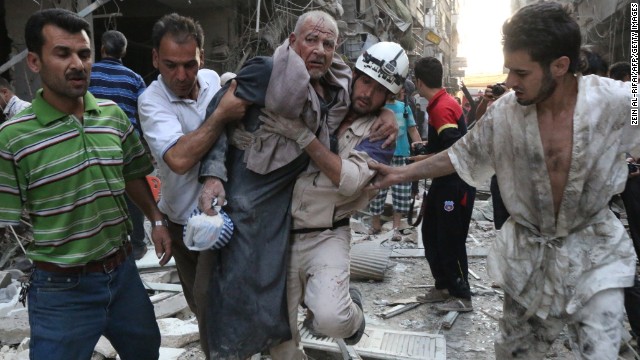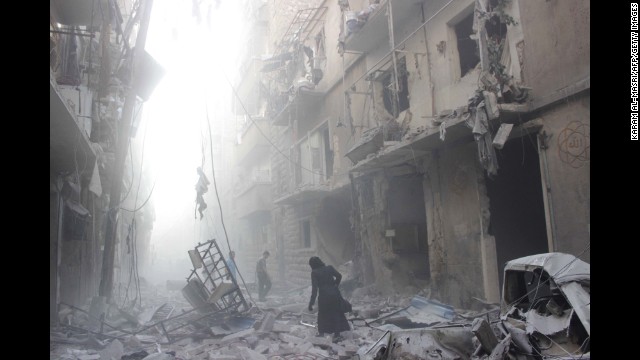The Syrian Regime Conquests in Reverse
"Now that they've mopped up rebel resistance to them in the east, [Islamic State (IS)] can turn to the regime. It may have been a benefit [to IS] to deal with rebels first, but the assault against the regime was inevitable."
Aymenn Al-Tamimi, expert on militant factions in Syria and Iraq
 People carry an injured man away
from the site of an airstrike, reportedly carried out by Syrian
government forces, in Aleppo, Syria, on Sunday, July 27.
People carry an injured man away
from the site of an airstrike, reportedly carried out by Syrian
government forces, in Aleppo, Syria, on Sunday, July 27. By now, Syria's three-year-old-and-counting civil war has seen the deaths of over 170,000 people. Almost half of the country's population have fled to refuge from death and destruction to refugee camps set up in Turkey, Jordan, Iraq and Egypt, living there in squalid tension. Millions of mostly Sunni Syrians have become internal refugees, unable to remain in their homes for fear of their government's barrel bomb attacks, though little enough is left of their former homes.
On Monday, during the Ramadan-closing celebratory day of the Eid feast, some 113 people were killed. Yet another barrel-bomb attack, courtesy of their caring government. A mere trickle considering that over 2,000 Syrians, half of whom were pro-government forces were killed in just over two weeks of fighting, of late. Doctors Without Borders stated late on Monday that a member of its staff was killed along with 24 other people in two car bomb attacks in the northwestern province of Idlib.
A Saturday car bomb hit the border town of Atme, targeting a busy market area on the eve of Eid. Thus do Muslims celebrate with one another, as co-religionists and brethren, as befits pious believers, during their holy fasting month of Ramadan, and its celebratory conclusion. "The rebels are now nine kilometres away from Hama military airport, which they want to put out of action", stated Syrian Observatory for Human Rights director Rami Abdel Rahman.
 A woman walks amid debris after an airstrike by government forces July 15 in Aleppo. The importance of Hama military airport lies in its purpose, because: "That is where the regime makes its barrel bombs, and warplanes take off from there to carry out air strikes on (opposition-held) areas across Syria", according to Yusef al-Hassan, a rebel leader located in the area. Barrel bombs, crudely barbaric, shrapnel-packed explosives are well known to have killed thousands of civilians in rebel areas of Aleppo.
A woman walks amid debris after an airstrike by government forces July 15 in Aleppo. The importance of Hama military airport lies in its purpose, because: "That is where the regime makes its barrel bombs, and warplanes take off from there to carry out air strikes on (opposition-held) areas across Syria", according to Yusef al-Hassan, a rebel leader located in the area. Barrel bombs, crudely barbaric, shrapnel-packed explosives are well known to have killed thousands of civilians in rebel areas of Aleppo.Rebels took possession of a major checkpoint north of Hama city, itself under regime control, on Monday night. The Tarabih checkpoint follows hard on Sunday's capture of a weapons depot in the area. "The regime has suffered several defeats in Hama province in recent days. As they have advanced, rebels have cut off the road linking Hama city, the provincial capital to a string of regime-controlled Christian and Alawite villages in the province's west", he added.
This series of recent setbacks for the Syrian government reflects as well a recent surge in deadly attacks by the Al-Qaeda-breakaway Islamic State now once again targeting Bashar Al-Assad's troops, as IS shifts priorities even while Sunni fighters attempt to consolidate their hold on territory and resources in northern Syria. Past government successes as the regime, with the aid of Hezbollah, turned back Free Syrian Army holdings into regime's hands are now coming undone.
The Syrian army is now pitted against a newly formidable force controlling large portions of territory in Syria's north and in neighbouring Iraq, well provisioned through its successful invasion-and-occupation of Mosul, with treasure, munitions and the heady essence of tactical battle successes. Only a dozen days earlier President Assad boasted, declaring victory, praising his supporters for "defeating the dirty war".
And now the mutual-dirty-war has come back to haunt him with government losses and ISIS gains. Fiercely successful and barbarically bloodthirsty fighters from IS have successfully launched attacks against army positions in northern and central Syria. The group captured a government-controlled gas field and two major army bases in three different provinces in the past week alone.
Over 300 soldiers, guards and workers at the Shaer field were killed by IS in an offensive that took three days to finally capture the field, since retaken by the regime. And beyond Syria, IS fighters are in possession of large swaths of northern and western Iraq. When it suited their immediate plans, government and IS forces avoided engaging, both concentrating in overcoming the resistance of the Free Syrian Army rebels.
Now, the regime is struggling to maintain what it wrenched from the rebels, while the IS group is committed to its battle to further expand its slowly burgeoning empire. Blood boils, roils and spills over the landscape.
Labels: Civil War, Conflict, Humanitarian Crisis, Islamists, Syria

<< Home